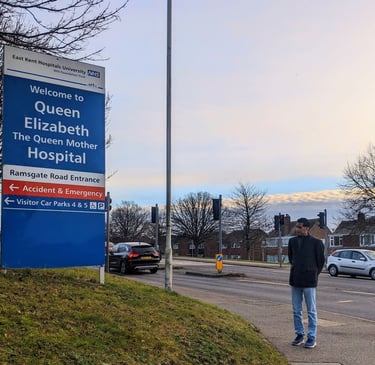When the Science Ends and the Soul Speaks
Two cases, two lessons. A doctor reflects on the profound ethical and emotional challenges in a busy medical ward of NHS, exploring the blurry line between fighting for life and respecting a patient's wish for dignity, and the moral strain of navigating complex care with limited resources.
PROFESSIONAL
Dr Zaw
9/28/20254 min read


Reflections on a Week in Deal Ward
The wards of an NHS hospital are a complex ecosystem, nowhere more so than in a busy general medical ward like Deal, where Rheumatology and Endocrinology—along with a host of other complex conditions—coexist. Last week, covering the rheumatology side, I found myself navigating this cross-specialty complexity. Working alongside Dr. Williams, a consultant whose sharp intellect and sensible, caring demeanour were a masterclass in UK medical practice, I was reminded that medicine is often less about clean diagnoses and more about messy, human decisions.
Over seven consecutive 12-hour shifts, two cases stood out, pulling me away from the purely scientific and deep into the ethical and emotional core of our profession. They serve as profound reflective learning points for any doctor working within the high-pressure environment of the NHS.
Case 1: The Undiagnosed and the Wish to Stop
The first case involved a woman in her late 50s who had been in the hospital for weeks with anasarca (severe, generalised oedema) that was refractory to maximal treatment. Despite exploring every avenue—from alcoholic liver disease (initial suspicion proved insufficient) to renal, heart and autoimmune causes — her condition remained a mystery. She was caught in a cruel cycle of diuresis, near-AKI, and persistent swelling.
The Crossroads of Care:
On Saturday, when I was the lone doctor on the ward, the family called. Their request was clear and heartbreaking: they wanted us to stop everything and simply make her comfortable.
My initial reaction was a deep unease. She was relatively young, and we still lacked a definitive diagnosis after nearly two months. I felt a pang of failure—the very thought that we might be giving up prematurely. It was the moment I wished for a fictional diagnostician like Dr. House M.D to swoop in and solve the puzzle. I quickly escalated the conversation to a senior colleague, who wisely deferred the final decision until the parent team, led by Dr. Williams, could have a comprehensive discussion on Monday.
This pause taught me an important lesson about escalation and professional boundaries. As the junior doctor, it wasn't my role to finalize an End-of-Life (EOL) decision with the family, especially given the complexity and the lack of a clear, unifying diagnosis. The best course of action was to ensure the patient was comfortable, respectfully acknowledge the family's wishes, and delegate the final discussion to the senior clinicians who had the most comprehensive oversight.
The Fluidity of Patient Wishes:
Throughout the week, the patient’s own wishes wavered. One day she quietly expressed a desire to be "left to die," sensing she was a burden. The next, feeling slightly better, she agreed with the ongoing active treatment. This highlights a critical GMC principle: patient autonomy must be continuously reviewed.
Learning Point (GMC Guidance): Patient wishes are not static. We must constantly reassess a patient's capacity and update their preferences, particularly regarding escalation and resuscitation, based on their changing clinical and emotional state. The ReSPECT (Recommended Summary Plan for Emergency Care and Treatment) form must reflect these changes, initiated by the parent team, not just the on-call doctor.
The Burden of Parallel Planning:
The team was engaged in parallel planning—maximum medical therapy while keeping a low threshold for EOL care. While this is often necessary in the NHS, the dividing line between active treatment and supportive care becomes blurred, creating emotional strain for junior staff during anti-social hours or weekend shifts and bank holidays with minimal cover.
Her eventual outcome was tragic: moved off the ward, admitted to ITU, and sadly passing away a few days later. It was a painful reminder that even with evidence-based medicine, we sometimes lose the fight against the "grim reaper." The palliative care nurse I spoke with was right: we needed a clearer picture of the patient's expectations, not just her medical status, from the outset.
Read more about "Treatment and care towards the end of life: good practice in decision making" by GMC here.


Case 2: The Gift of the Bed
The second case was a woman, only 69, frail and admitted with a fall and significant safeguarding concerns stemming from self-neglect. Initially confused and unwell, she dramatically improved once we initiated heart failure treatment.
A Sensible Request:
One morning, fully alert, she looked at me and asked for her doctor. When I confirmed I was her doctor, she delivered a request that stopped me cold:
"Can you please tell my doctor to let me go and get on with my life? I am ready to die... Let me get on with my life, you know, and give this bed to someone who really needs it."
My immediate, argumentative response—"You are not going to die. You will get better"—was a failure of empathetic listening. It was an involuntary, emotional block to a deeply sensible, if morbid, request.
Her concern about freeing up a bed for a needier patient was a staggering display of altruism. It sharply contrasted with the experience of seeing medically well, often younger patients remain in hospital for months—what is known as Delayed Discharges or "bed-blocking"—while awaiting care packages, equipment, or social housing. This unnecessary prolongation of stay not only exposes them to nosocomial infections but also represents a severe abuse of NHS resources and taxpayers' money.
Learning Point (Empathy and System Awareness): My duty is to treat, but also to listen without judgment. I need to be better at meeting profound, existential statements with genuine curiosity rather than clinical rebuttal. Her comment highlighted a systemic moral distress: the reality of the NHS where a patient is willing to give up a life-saving bed, while others exploit the system for accommodation. This experience reinforces the importance of timely and efficient Discharge Planning—a crucial duty for all ward doctors to ensure equitable resource use across the NHS.
These two cases, side-by-side, perfectly encapsulate the constant ethical wrestling match of hospital medicine: how do we balance the clinical duty to fight for life with the human duty to respect a patient's wish for dignity, all while managing a system under immense strain?
They remind me that the science of medicine is only the tool; the true art is in the conversation, the listening, and the courage to acknowledge when the science ends and the soul speaks.


Read more about "Treatment and care towards the end of life: good practice in decision making" by GMC here.
Blog
From Yangon to UK: Decades of Medicine, Moments of Reflection
LINKS
SUBSCRIBE
© 2025. All rights reserved.
